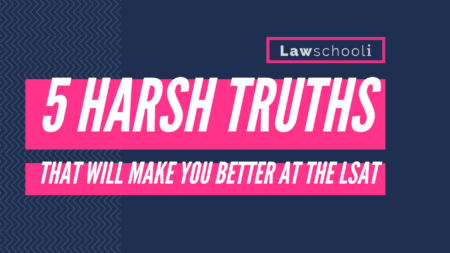To make this post, I took myself back to when I too was an LSAT noob and thought, what do I wish I had known when I started studying for the LSAT? Well, I wish I had known that the economy would implode later that year (2008) and take the legal market with it, but let’s forget that. This is for LSAT-specific stuff. We’ll do a “10 things I wish I knew before I decided to go to law school” post soon.
Here are 7 things it would have helped me to know at the beginning of my LSAT prep.
7 Things I Wish I’d Known When I Started Studying For The LSAT
Don’t Bounce Around Too Much
When you sit down to prep for the LSAT, you should have a clear objective—narrow your focus and work on improving one thing at a time.
I had the mistaken idea early in my prep that I should learn a little about at least two section types each day, so I’d study a little LG and maybe some RC, for example. I thought variety would help stave off boredom, but I think it hurt my early prep efforts to do this.

It’s better to keep to one subject a day when you are first learning this stuff. After you’ve learned the fundamentals, it’s okay to bounce around more.
Choose Your Testing Center Carefully
Visit your testing center ahead of time to ensure that it is a good environment to take the most important test of your life.
During your prep time, you may have been spreading out your practice materials luxuriously across the wide expanse of your home table. You show up on test day only to realize that the desk you’ll be sitting at during the most important exam of your life you’re expected to cram in and keep the test booklet folded so that it can fit? That could throw anyone off.
Getting into the test center and realizing you have a hobbit-sized desk is the worst.
This almost happened to me. Luckily, I was okay because I had scoped out the test center, knew it was coming and practiced having no space. However, if I could do it again, I would have just avoided the whole snafu by choosing a testing center more carefully. Use Google, and you can usually get info on the places you should avoid.
Also, sign-up for the LSAT relatively early so that the better locations aren’t full.
Late Night LSAT Study Should Be Limited
Schedule your prep when you’re at your freshest & get plenty of sleep to ensure that what you learned “sticks.”
Vince Lombardi once said, “winners never quit, and quitters never win” I don’t think that’s so true when it comes to LSAT study — sometimes you have to know when to give up for the night. If you are exhausted, studying might even hurt you.

I had the idea that powering through it when I was tired would help me be ready if I was tired the day of the test. Well, you might want to try it a couple of times. Studying tired isn’t that helpful. It’s not like cramming for a college exam where you have to remember the stuff for the next 12 hours. You are trying to develop a skill that you can wield like a pro no matter what.
Late night, tired-out studying is probably even worse later in your prep when you are combating burnout. Then, time sleeping should be the priority over another hour of prep. This doesn’t mean you should skimp a lot on total study time. Rather, consider shuffling your schedule around so that you are prepping when you are alert.
The Biggest Prep Companies Aren’t Necessarily The Best
If you’re getting insurance, usually the first thing you think is “GEICO!” Now I have no idea whether Geico is the best or not. I know they’ve done really well building a national brand.
When I was an LSAT neophyte, I got some Kaplan and Princeton Review books because I recognized the brand names well. The younger me wasn’t brilliant.
You are future lawyers now, so it’s time to stop with the knee-jerk buying decisions.
Seek advice before you decide, and not just mine, though I’ll give mine here: avoid Kaplan and Princeton Review, especially their books.
Related: Josh’s list of the Best LSAT Prep Books
Related: Best LSAT Prep Courses
If they ever were making cutting-edge LSAT materials, it must have been before Clinton was President. Nowadays, they treat potential LSAT students like this:

It’s just a money game for them, and it shows.
I always say to go with the companies that got their start teaching LSAT prep. They have better reputations in the law school world and a bigger incentive to protect that reputation.
If you have a question about any specific prep resource, ask in the comments below. As a former professional LSAT tutor and now part-time LSAT blogger, I’ve seen it all. If you’re self-studying, you can find our recommendations here: How I Got A 177 On The LSAT and check out our recommended LSAT Study Schedules here.
Tips Only Take You So Far
When I started, I thought that if I learned the right combination of tips and techniques that everything would click into place.
That’s the wrong attitude. Learning the fundamentals is stage one. It’s probably 30% or less of the game. The real meat of LSAT study is where you sit your ass down and apply these techniques over and over again until you know the right methods in your sleep.
I suspect this particular misconception is why so many poor, innocent LSAT students study only a month or so before the test. They end up wasting time and money and now have to do the whole thing over, or worse, they go to law school with a substandard score. Really, a month is just about enough time to learn the basic techniques. It’s not enough time to start getting good at them.
It would be best if you were deeply suspicious of any LSAT company that purports to be able to get you ready for the LSAT inside the space of a month. One of the companies whose products I otherwise like, Powerscore, provides instruction tailored to studying for a short period of time, and it’s unfortunate. For over 99% of test-takers, that time frame will not get you close to your potential, and they know that.
For our full reasoning, see this post on how long you should prep for the LSAT.
Work Efficiently: Plan & Attack.
This amounts to what we call in evidence law a “statement against interest” since I run an LSAT prep blog. Still, I’m basically telling you it’s okay not to spend a crazy amount of time on the internet looking up LSAT-related stuff.
When I was prepping, I got sucked into the information overload. I was surprised later when I found out that many LSAT takers are successful without consulting the internet for every decision they made regarding their LSAT prep habits.
LSAT prep can be very straightforward, so if it feels natural to isolate yourself from the noise on the internet, that’s okay. Just remember what you need to do, and you can’t go wrong:
Step 1: Pick great LSAT prep materials to learn the fundamental techniques that will serve as the foundation of your prep.
Step 2: Learn how to approach the problems using a consistent approach (consider consulting with our LSAT study schedules as a guide).
Step 3: Keep practicing using real LSAT preptests until these techniques become second nature.
Step 4: Reach out to a trusted advisor/mentor and get help when you need it. (consider joining the LSAT Mastermind Study Group for unlimited support from Evan and me)
That’s kind of it. It’s tempting to think some decisions, like whether you should start drilling timed sections 8 weeks before test day or 10 weeks before test day, will make or break you… it’s probably not. On the other hand… if you spend 2 hours getting sucked down a googling rabbit hole every time you decide how to prep… that could end up wasting a ton of valuable prep time that you could spend much more wisely.
However, if you are the sort of person that likes to plan everything and get lots of advice, that’s okay too. I’m a micro-planner when I’m trying really hard at something, and analyzing everything worked great for me. Don’t fight your nature.
No matter your strategy, always try to consult experts sources when you are stuck. They’ll often have a new approach to a problem that may help you. That’s one of the main reasons why we started the LSAT mastermind group: we wanted to provide students with several ways (private forums, office hours, webinars, online lessons, video explanations, etc.) to learn from and interact with us so that they didn’t have to put their fate in the hands of anonymous forum posts full of trolls and shills.
Conditional Reasoning Skills Are 100% Critical
When you look in many prep books, conditional reasoning is just another topic covered in one of the chapters. Because of that, it’s easy to overlook its importance. Don’t skim this stuff. You need polished critical reasoning skills to have even a hope of a decent score on LR and LG. Not only that, you really can’t be making substantial improvements until you get a solid foundation in conditional reasoning.

Think of a great LSAT score as a destination called 170+ land, and there is a nice scenic path that leads you there.
Now, learning conditional reasoning cold is the good path that goes straight to 170+ land. The other path brings you into the fire swamp. You’ll be lucky to get out in time to make it to 170+ land in time for the test.
Don’t screw around in the fire swamp. Please take the right path the first time and learn conditional reasoning. Learn it well.
Check out our free “Complete LSAT Conditional Reasoning Lesson” and our “LSAT Conditional Reasoning and Logic Quiz. “

BONUS: Get Support!
It’s nearly impossible to prep 100% effectively without an expert guiding you. Fortunately, we are here. With our study group, you get unparalleled access to two experts, Josh and Evan, plus the support of your peers.
- Hundreds of LSAT Lessons
- Whether you’re just getting started or need an extra boost, our video & text lessons are the perfect addition to your LSAT prep materials
- Unlimited Lifetime Access!
- Join Today & You’re a Member for Life! Your membership never expires. No renewal fees. No upsells. Once you’re in, you get everything! Forever!
Testimonial
“My score (170) far exceeded my expectations and was outside of what I considered the realm of possibilities. Thank you so much for setting up this low cost/high value group. For those of you out there who haven’t taken the LSAT or are considering a retake, feel confident that you can definitely crush the LSAT with Josh and Evan’s advice.”
–Brian
You can CRUSH the LSAT
Unbeatable coaching from two experts that you already trust. We are only taking a limited number into our group, so sign up now while there is still space!




5 Comments
what do you think about the prep course, TestMaster with Robin Singh?
I can’t afford any of these prep courses. I only need work on the logic section.
We’ve actually been working hard on a logic games course that is launching soon (very reasonably priced!)
Join our mailing list or check back soon for details!
Hello!
I’m trying to calm my nerves by going through pretty much the entirety of your website before my LSAT which is coming up in just over a week. I’m scoring in the low 160s but I really would like to improve and break the 170 mark. Is that possible (or rather what is the possibility) given I only have a week left or should I not take the LSAT now and take it when I am more fully prepared in 4 months (Feb 2016)? I still have about 10 of the more recent prep tests (after 50) left and most of old ones. I’m debating whether I should use all the new tests now or save them and take the later LSAT. I also just bought copies of the Powerscore books which I plan to go through pretty much fully in the next 3-6 days. My plan of attack is to do 1-2 solid days of games until I can perfect them (currently get 1-5 wrong), categorize my argument trouble areas and fix them, and figure out something for reading comprehension using the books and practice tests. I also still have 1 year before I apply to law schools, my reach schools being the Top 6, my GPA is almost a 3.8 and likely will be 3.8 by the time I apply.
What’s your opinion of Fox LSAT Prep online class? I am considering taking the blueprint in-person class or the fox LSAT prep online class since I am not in the San Francisco area. I really appreciate your help.